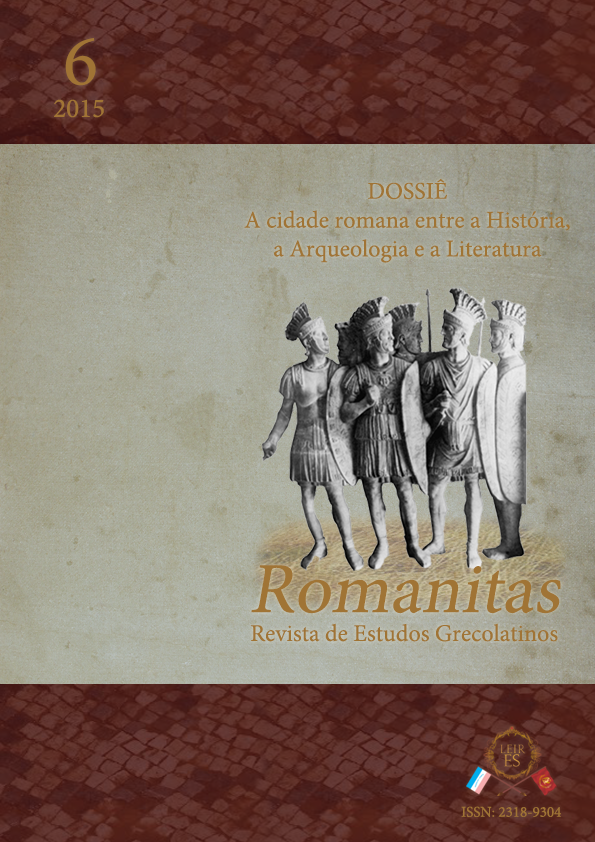A note on Catullus 8 and 58: the fragmenting of ‘ego’,and Lesbia’s vulgarization
DOI:
https://doi.org/10.17648/rom.v0i6.11975Keywords:
Catullus 8, Catullus 58, Multivoiced ego, Lesbia, VulgarizationAbstract
A distinguishing feature of Catullus’ poetics, which was followed by other poets, is the use of his own name to present a “multivoiced ego” in his poetry, as it has been shown by Greene (1995), i.e., this ego can emerge from poetry in the first person singular or plural, in the second person singular or in the third person singular. This supposed grammatical “inconsistency” does not indicate a uitium elocutionis against the puritas or latinitas of the poetic speech, but it must be seen as a poetic uirtus which operates in the argumentative structure of his collection, no matter if we identify either one or three books of poetry in this corpus. This article aims to show how we can read this linguistic fact considering an argumentative structure whose purpose is to support the delineation of Lesbia’s poetic persona within the narrative of Catullus’ collection.
Downloads
References
ALLEN, A. W. Sincerity and the Roman elegists. Classical Philology, n. 45, p. 145‑60, 1950.
DYSON, M. Catullus 8 and 76. Classical Quarterly, v. 23, n. 1, p. 127-143, 1973.
FEAR, T. The Poet as Pimp: Elegiac Seduction in the Time of Augustus. Arethusa, v. 33, n. 2, p. 217-240, 2000.
______. Propertian Closure. In: ANCONA, R.; GREENE, E. (Eds.). Gendered Dynamics in Latin Love Poetry. Baltimore: The Jonhs Hopkins University Press:13-40, 2005.
FITZGERALD, W. Catullus and the Reader: The Erotics of Poetry. Arethusa 25, p. 419-43, 1992.
______. Catullan Provocations. Lyric Poetry and the Drama of Position. Berkeley: University of California Press, 1996.
GAISSER, J. H. Catullus. London: Blackwell, 2009.
GREENE, E. The Catullan Ego: Fragmentation and the Erotic Self. American Journal of Philology, v. 116, n. 1, p. 77-93, 1995.
______. Gender Identity and The Elegiac Hero In Propertius 2.1. Arethusa, v. 33, n. 2, p. 241-261, 2000.
GRIFFIN, J. Augustan Poetry and the Life of Luxury. Journal of Roman Studies, v. 66, p. 87-105, 1976.
______. Latin Poets and Roman Life. London: Duckworth, 1985.
GUNDERSON, E. Catullus, Pliny, and Love-Letters. Transactions and Proceedings of the American Philological Association, n. 127, p. 201-231, 1997.
LYNE, R. O. A. M. The Latin Love Poets: From Catullus to Horace. Oxford: Clarendon Press, 1980.
MARTINS, P. Breve história da crítica da Literatura Latina. Classica, v. 21, n. 2, p. 189-204, 2008.
______. Elegia Romana: Construção e Efeito. São Paulo: Humanistas, 2009.
______. Rumor, lei e elegia: considerações sobre Propércio 2.7. Archai, 2015b. Em edição.
______. Sobre a metapoesia em Propércio e na poesia erótica romana: o poeta rufião. Classica, 2015b. Sob referee.
______. O jogo elegíaco: fronteiras entre a cultura material ou intelectual e a ficção poética. Nuntius Antiquus, 2015c. Sob referee.
MUSE, K. Fleecing Remus’ Magnanimous Playboys: Wordplay in Catullus 58.5. Hermes, v. 137, n. 3, p. 302-313, 2009.
ROWLAND, R. L. ‘Miser Catulle’: An Interpretation of the Eighth Poem of Catullus and Catullus. Greece and Rome, v. 13, n. 1, p. 15-21, 1966.
SKINNER, M. Catullus 8: The Comic ‘Amator’ as ‘Eiron’. Classical Journal v. 66, n. 4, p. 298‑305, 1971.
WISEMAN, T. P. Catullus And His World. A Reappraisal. Cambridge: Cambridge University Press, 1985.
Downloads
Published
How to Cite
Issue
Section
License
Copyright (c) 2016 Romanitas - Revista de Estudos Grecolatinos

This work is licensed under a Creative Commons Attribution-NonCommercial-NoDerivatives 4.0 International License.
a. The authors retain copyright and grant the journal the right to first publication.
b. The authors are authorized to assume additional contracts separately, for non-exclusive distribution of the version of the work published in this journal (e.g., publishing in institutional repository or as a book chapter), with acknowledgment of authorship and initial publication in this journal.
c. Authors are allowed and encouraged to publish and distribute their work online (e.g. in institutional repositories or on their personal page) after the first publication by the journal, with due credit.
d. The journal's texts are licensed under a CC BY 4.0 Deed Attribution 4.0 International Licence (CC BY).




























